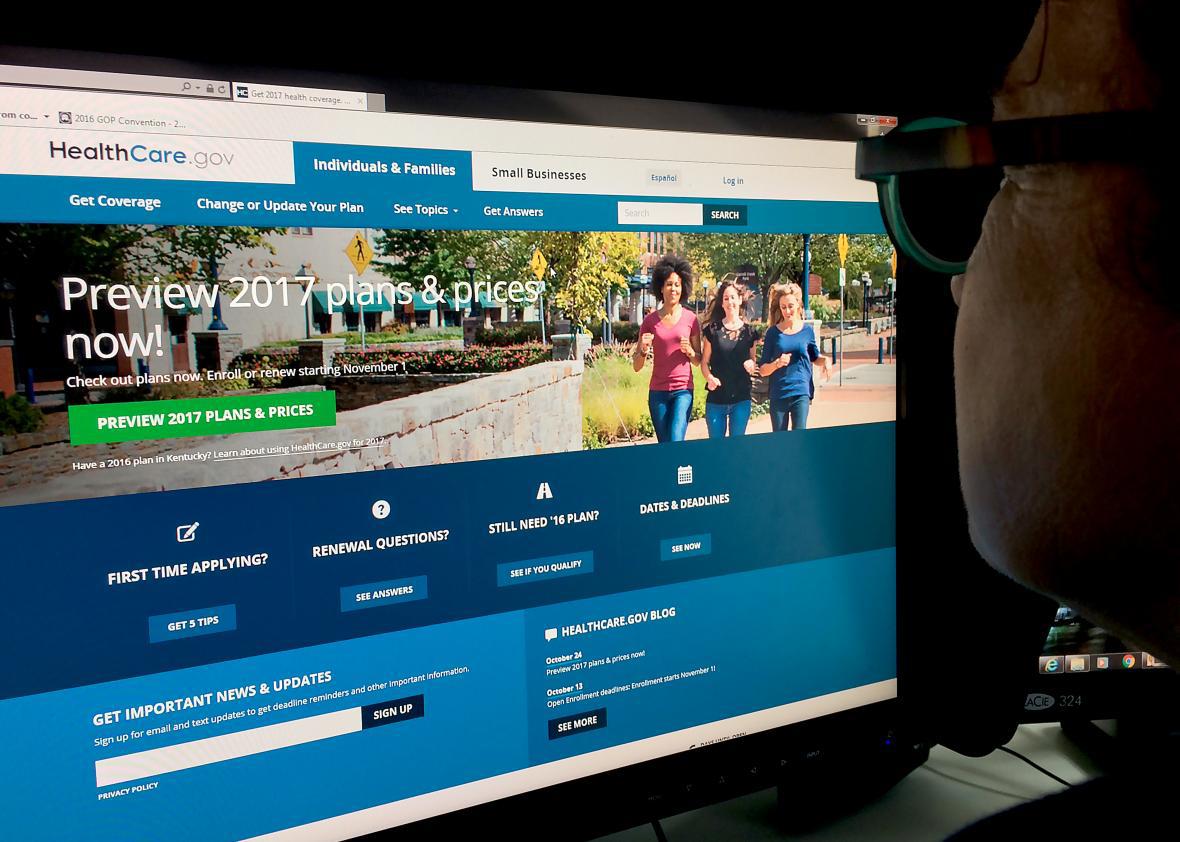Millions of Americans who would qualify for financial help to buy health insurance under Obamacare seem to be leaving that money on the table by purchasing coverage that’s ineligible for assistance, according to a new paper published in the journal Health Affairs.
Why are so many people turning down government help? In short, we don’t know for sure. But the study, authored by researchers from the Urban Institute and Michigan State University, raises a familiar issue with the health law. For many insurance shoppers, Obamacare may just be too confusing.
If you’re reading this article, chances are you’re familiar with the Affordable Care Act’s online insurance exchanges—the state and federal websites, like healthcare.gov, where Americans can compare plans and buy coverage every open enrollment season. Most Americans who buy insurance on the individual market now use these portals, and for good reason: In order to qualify for Obamacare’s coverage subsidies, you have to get your insurance through an official exchange.
Nonetheless, there are still millions of Americans who have continued to buy their coverage off the exchange. Often, the plans they choose are identical to what’s offered on ACA’s marketplaces. The running assumption among health care experts I’ve talked to over time was that the vast majority of those customers probably made too much money to receive any government help, since only families that earn between 100 and 400 percent of the poverty line are eligible for Obamacare’s tax credits. For those not getting a subsidy, it might be easier and less of a time suck to buy directly from an insurer, rather than log on to healthcare.gov and fill out a long form. They may also be able to find insurance options with slightly wider networks or other advantages.
Except, it turns out that a lot of those Americans shopping off the exchanges would qualify for subsidies. Using the data from the National Health Interview Survey, the Michigan State and Urban Institute team estimated that 6.3 million nonelderly adults bought their insurance coverage outside Obamacare’s marketplaces in 2015. Almost 41 percent of them reported incomes between 100 and 400 percent of the poverty line—meaning they should have been tax credit eligible. Almost 19 percent earned less than 250 percent of the poverty line, meaning they would have qualified for special subsidized plans that lowered their out-of-pocket costs like deductibles and co-pays.
But for some reason, they said no thanks.
For a number of consumers, that may have been a rational choice. Many younger, healthier Americans, for instance, have chosen to skip the exchanges and buy inexpensive, short-term health plans that don’t meet Obamacare’s regulatory standards. These policies don’t cover pre-existing health conditions and can include lifetime caps on coverage. As a result, the federal government doesn’t actually consider them insurance, and those who buy them still have to pay the individual mandate’s tax penalty for the uninsured. Even with that added cost, short-term plans may be more affordable for some.
Still, it seems fairly obvious that some people are simply overpaying for coverage because they don’t know any better. “I have to think a lot of them just aren’t aware they could get better deals buying through the exchange,” the study’s lead author, Michigan State economist John Goddeeris, told Modern Healthcare. “Probably a good number of people are making a mistake.”
This is not the first study to suggest that millions may be unwittingly forgoing Obamacare’s financial assistance. A January Health Affairs study found that 31 percent of Californians who bought insurance on the individual market in 2014 missed out on the ACA’s premium tax credits or cost-sharing subsidies either because they bought insurance off the exchange, or chose the wrong kind of plan. One clue about what might have gone wrong: People who qualified for aid but bought off-exchange coverage anyway were less likely to have gotten help from an insurance counselor. Meanwhile, in a 2015 survey by the Robert Wood Johnson Foundation, 59 percent of the uninsured said they either did not know about Obamacare’s tax credits, or didn’t understand them.
The ACA has done an enormous amount of good by helping millions obtain health insurance they otherwise couldn’t afford. But it’s also a complicated policy contraption that assumes a relatively savvy consumer, and without extensive public education, many people are simply going to miss out on its benefits. Even the Obama White House seems to have failed at adequately spreading the word, which may well have hurt the law politically; it’s easy to imagine that some voters who were enraged by rising premiums didn’t realize the government was there waiting to give them a tax credit. Now, the ACA is being run by an administration that has spent months gradually sabotaging the law for political gain, and will almost surely cut back on outreach. I’m guessing the number of people paying more than they should for coverage is about to rise even higher.
